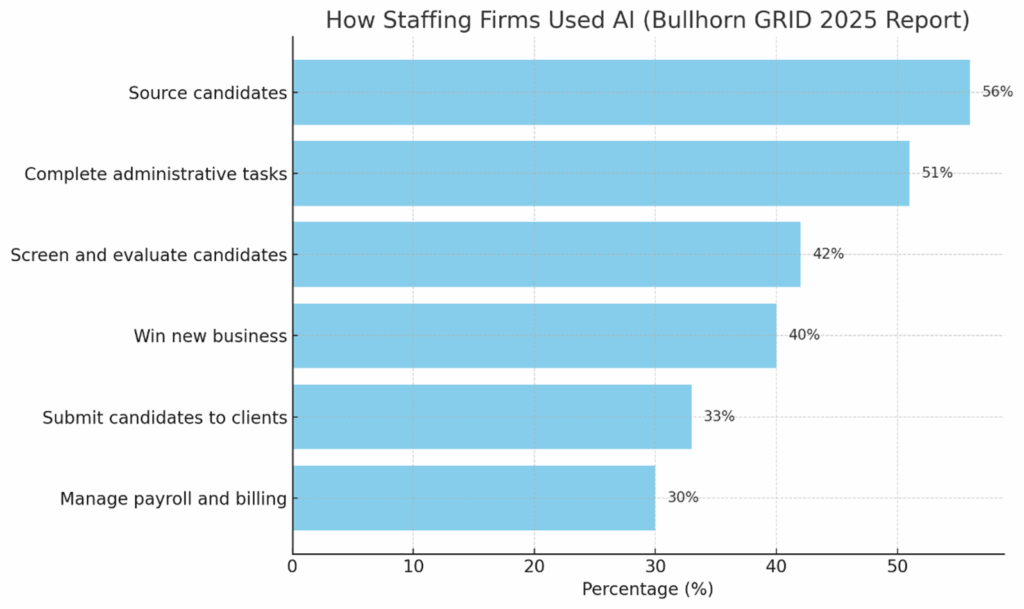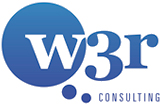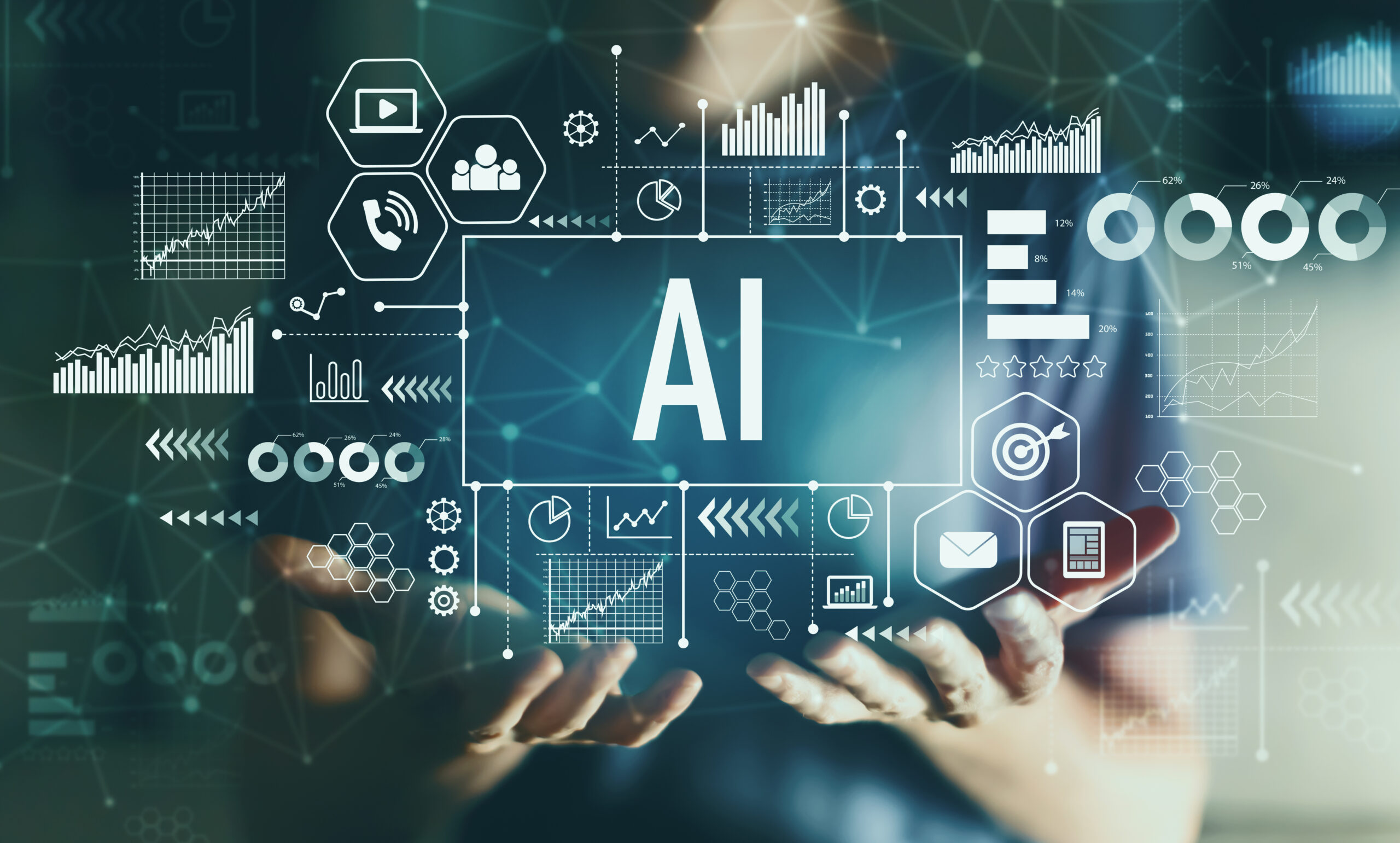How much human involvement will you need to hire your next top performer?
Companies have been asking that question since large language models made a massive leap in performance back in 2023.
And as business leaders have tested generative AI and agentic AI tools, they’ve discovered steps throughout the hiring lifecycle where machines can make a positive impact.
That in mind, we are still convinced AI in the hiring process will not replace human recruiters and HR professionals, but augment their productivity, creativity, and bandwidth.
Here are some of the benefits of using AI in recruitment as well as the ways recruiters and project-based staffing partners still add value.
An Overview of AI Capabilities
Before we dig into how companies are using AI in recruiting, let’s explore the various AI-powered capabilities in use. You’ve likely heard of most of these approaches, but we want to define them before we get too deep into recruiting use cases:
- AI Chatbots – These tools engage with candidates in real time, answering questions, scheduling interviews, and providing updates 24/7. They improve candidate experience while freeing recruiters from repetitive tasks.
- Generative AI – This form of AI creates new content based on user prompts. It’s essentially a text prediction model, generating what the model reasons is the most likely the sequence of words to satisfy the query. It accelerates content development while maintaining consistency and tone.
- Agentic AI – Unlike other automation, agentic AI systems can make autonomous decisions, take actions, and complete end-to-end tasks to achieve complex goals. Plus, they require minimal human input to manage workflows and learn to improve their results. Some AI agents have even unlocked the ability to use computers, keyboards, and mice.
While these AI capabilities are powerful, it’s important to recognize that we haven’t reached true Artificial General Intelligence (AGI) or AI that can think, reason, and adapt like a human. However, close enough to the horizon that organizations with a mature AI strategy are watching breakthroughs closely.
Automating the Routine Work
What percentage of your recruiting processes can be automated? According to McKinsey, 66% of people management processes can be largely automated. When it comes to the recruitment lifecycle, they found that various stages could be partially or fully automated including:
- Screening and assessing
- Interviewing, extending offers, and providing feedback
- Designing and delivering onboarding
- Measuring experience, effectiveness, and efficiency
Generative AI and agentic AI have made it easier for HR professionals and recruiters to accelerate the routine, mundane, or impersonal elements of their jobs. The Bullhorn GRID 2025 Industry Trends Report found that staffing firms used AI to:

Though these steps are essential to recruitment, they don’t require deep critical thinking or interpersonal finesse that humans can do better than machines. So, AI is simply freeing up people from these tasks so they can refocus on ways to hire top talent in a challenging talent market.
Enhancing Decision Making
Because AI is incredible at pattern detection, we’re also seeing these tools clarify some of the best choices in the recruitment processes. A growing number of HR and recruiting platforms provide AI-powered dashboards that can analyze and interpret huge volumes of data, providing insights that predict which candidates will be most interested in opportunities, when to send communications, and when to scale up your workforce. With AI agents, these models are more rapidly learning and improving their predictions based on the data they receive.
One particularly innovative application of AI technology is its use as a tool for forecasting employee attrition. Workday, for example, is using their Illuminate AI model to help customers to forecast attrition risk using the surveying capabilities of Peakon Employee Voice. With that information, organizations have several options: preemptively approach the employee in hopes of retaining their talent or ramp up the hiring process to reduce the length of time a position remains vacant.
Keeping the Personal Touch
Where recruiters and project-based staffing partners are indispensable is with interpersonal interactions and analytical thinking. Candidates still value the ability to talk with a flesh and blood person who can address their needs and feel like a partner. Though AI programs are vital for setting the wheels in motion to connect candidates with new opportunities, emotional intelligence and human touch are still what drive the hiring process to completion.
Plus, keeping a human in the loop is vital for major hiring decisions. AI recruiting tools are only as good as the quality and completeness of their underlying data. If the training model is fed low quality, inaccurate, or biased datasets, it can make flawed deductions that prevent companies from hiring exceptional talent. Pairing an experienced recruiter with AI for sourcing, screening, and interviewing can confirm when the model is right and push back when it makes flawed decisions.
Furthermore, AI is still only equipped to handle predictable challenges or tasks. The curve balls thrown by complex real-world situations still require recruiters and HR professionals who can create new solutions for novel problems. In both situations, success depends on you working with the right staffing partner to maximize the impact of these increasingly impressive AI tools.
For organizations that want to harness AI but need experts to offer foundational support, w3r offers a reliable advantage. Our team can help analyze the workforce requirements of your planned AI projects and connect you with onshore and offshore AI talent fast. That way, you get humans and machines working to elevate your performance.
Ready to expand your AI capabilities? w3r Global Solutions offers offshore AI staffing to unleash your next AI initiative fast and cost effectively.
Related Articles
Does Your Data Architecture Align with Employees’ Needs?
The Truth about the Healthcare IT Talent Shortage
How Data Analysis Is Changing Workforce Management

